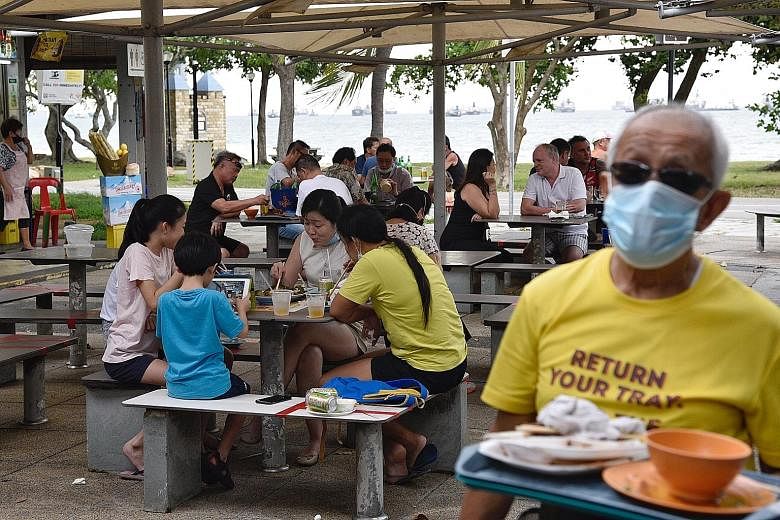The Covid-19 pandemic has highlighted the importance of personal hygiene, but the test of whether it has changed people's habits will be in phase two of Singapore's reopening, when people are allowed to dine in at food and beverage outlets again.
Diners will be reminded by safe distancing ambassadors to pick up after themselves at hawker centres and coffee shops.
But the Government may consider rolling out regulations to make this mandatory, said Mr Masagos Zulkifli, Minister for the Environment and Water Resources.
"We may even resort to regulations... We have to see how things evolve," he said in an interview with The Straits Times and Chinese daily Lianhe Zaobao that was broadcast yesterday.
"Most importantly, I hope that we embrace this, understand how it affects our public health, as well as how it affects people around us," said Mr Masagos.
Compassion and care for the environment and those around us should be what spurs people to be more hygienic when eating out, he said, and not regulations.
Mr Masagos heads the SG Clean Taskforce, which was set up in March to raise hygiene standards across the country and to change social norms so that they become Singapore's first line of defence against current and future outbreaks of infections.
While the question of how clean Singapore is has been a perennial one, it has come into stark relief during the Covid-19 pandemic.
In March, a check by The Straits Times at five hawker centres islandwide found that many diners still left their dirty dishes, leftovers and used tissues on the table for workers to clean up after them.
This occurred even though a number of customers were observed wiping the tables with hand sanitisers and disposable wipes before sitting down for their meals.
Used tissue paper or wet wipes - which Mr Masagos described in earlier interviews as being "little biohazards" - can be contaminated, as they are often used to cover a person's nose and mouth when coughing or sneezing, or to wipe respiratory discharge and sputum.
Contact with such contaminated droplets is considered the primary way that the coronavirus, which causes Covid-19, is transmitted from person to person.
Mr Masagos said: "We (want) to remind the population that (public hygiene) is not just for Covid-19. We have to adjust our basic habits so that whether it's Covid-19 or other viruses, we are not spreading them."
This includes practices such as not sharing utensils and not leaving used tissue paper behind.
"In phase two, we will come back with full force and raise the cleaning standards both by the industry as well as to instil good habits in our population," Mr Masagos added.
Earlier this week, the National Environment Agency, which Mr Masagos oversees, said it will introduce a toilet improvement programme for coffee shops and hawker centres that have ageing infrastructure.
These premises will get co-funding to refresh the designs of older toilets and to speed up the adoption of new technologies and productivity measures to make the toilets easier to clean and maintain, the agency said.
The programme will also factor in downstream operations and maintenance issues. More details will be given later this year.
But Mr Masagos said people must also ensure that they flush properly when they use public restrooms, citing recent scientific findings on how Covid-19 patients' stool may contain traces of the virus.
There have not been reports of patients getting the disease through such a transmission route so far, but the findings raised the possibility of a faecal-oral route.
"There have been many studies, although not verified fully, on issues around the hygiene of public toilets in terms of whether they can pose a risk to other users if one of them has Covid-19," said Mr Masagos.
"But it is better to take precautions - in terms of how we clean, how frequently we clean, as well as advising users on the right way of using them."











